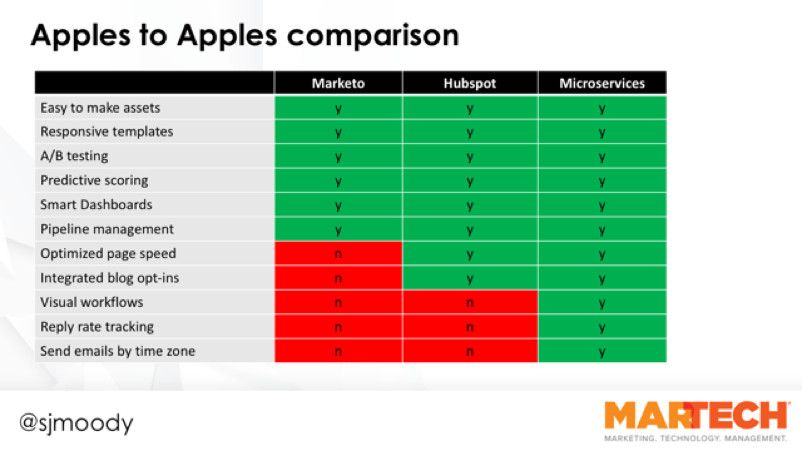Three Things Marketing Automation Vendors Won't Tell You

- Email deliverability is (quietly) becoming a crisis.
- All in one platforms no longer offer the best features or price.
- Facebook is a winning channel for B2B - with the right program.
Email deliverability
I've spoken to dozens of marketers in the past two months and the one thing I'm hearing from those in the trenches is deliverability issues. Whether they use Marketo, Hubspot, Eloqua, it is the same result: third party ESPs no longer reach the recipients. You won't hear about this from agencies or vendors, though, because most emails now reach inboxes that no longer confirm or deny the send. This means your email deliverability is far lower than your metrics show, and it is in no ones interest to point this out.
There are exceptions: I have a weekly email program that receives more clicks than sends running out of Mailchimp. Is Mailchimp a better ESP? Does this engagement level solve the deliverability issue? Or is it simply a small enough list that it doesn't raise the red flags? Likely some combination of all three.
No one likes to highlight a problem without providing a solution, and most marketers scratch their heads on this one because they haven't tried the alternatives yet. For now, the best approaches seem to be coming from Sendgrid and sales tools like Toutapp, but this problem is expanding and may threaten email as a channel in 2017.
Platforms no longer offer the best value
Unless you have a sweetheart deal, marketing automation platforms no longer offer the best features or value.

Many advanced marketers I've met have lamented at the lack of R&D investment and aggressive tactics that lock in customers to these platforms. Some are better than others, but they all share the same traits: they spend more effort to become your system of record than actually building the features that will grow your pipeline.
Meanwhile bootstrapped marketers have latched on to the next generation of marketing tech, a generation built on quality product and a growth model based on that product.
If you're a VC-backed startup this might be hard to swallow: everyone in your space probably has one of the standard platforms and its risky to break from that mold. But the winner in your market will most likely quarantine that platform to be its system of record and nothing more, while they add on the best tools to get the job done.
If you must use a marketing automation platform, I recommend immediately implementing a tool like Segment, which will give you the future optionality to migrate without a loss of historical reporting.
Facebook as B2B channel
Not all is bleak: while your marketing automation is likely a sunk cost and your email issues will only continue, the good news is Facebook has become a strong B2B channel.
I was skeptical of using Facebook as a B2B channel for years, until I started testing programs there. What I found was a highly targeted platform with 10x better ROI than other channels, and a lack of sophisticated competition in the B2B space.
You cannot run the same ads on Facebook that you run everywhere else. Facebook is your prospect's living room, and your ads should be suitable to that location. In my experience the best mental model here is "engage the person and convert the account." Programs that resonate with the prospect on a personal level will cut through the noise, and you will then have the attention window to market to the company.
Done right, it works far better than AdWords and LinkedIn, because nearly every prospect is on Facebook for something and the ad inventory simply works better to convert the busy prospect.